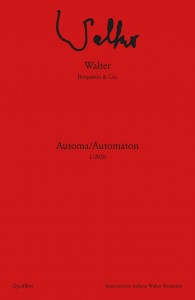Walter
Benjamin & Co.
https://www.quodlibet.it/riviste/testata/126

Struttura di ogni numero / Structure for each issue
Lingue / Languages
Italiano, Tedesco, Inglese, Francese, Spagnolo / Italian, German, English, French, Spanish
1. Einbahnstrasse: sezione monografica / monographic section
2. Passages: parte miscellanea / miscellaneous section
3. Krise & Kritik: Recensioni / Reviews
4. Correspondances: varia (interventi esterni, non scientifici) / varia (external non scientific
interventions and writings)
Programmazione / Planning
Numero 1, 2026: “Automa/Automaton”
Numero 2, 2027: “Generazione / Generation”
Numero 3, 2028: “Cronaca / Chronicle”
Comitato scientifico / Advisory Board
Sonia Arribas (Universidad Pompeu Fabra Barcelona, E)
Petar Bojanic (University of Belgrade, SE)
Susanne Buck-Morss (Cornell University Ithaca, USA)
Judith Butler (UC, Berkeley USA)
Howard Caygill (Kingston University, London, UK)
Maria Teresa Costa (Universität Lüneburg, D)
Fabrizio Desideri (Università di Firenze IT)
Donatella Di Cesare (Sapienza Università di Roma, IT)
Peter Fenves (Northwestern University Evanston, USA)
Simona Forti (Scuola Normale Superiore, Pisa, IT)
Eli Friedländer (Tel Aviv University, IS)
Jeanne-Marie Gagnebin (Instituto de filosofia e de Ciências Humanas, Université de Campinas,
BR)
Karl Clemens Haerle (Università di Siena, IT)
Martin Jay (UC Berkeley, USA)
Julia Ng (Goldsmiths University of London, EN)
Sami Khatib (Beirut Institute for Critical Analysis and Research, L)
Michael Löwy (emeritus research director at the CNRS, Paris F)
Marco Maggi (Università della Svizzera Italiana, CH)
Maria Filomena Morder (Universidade nova de Lisboa, PR)
Elena Tavani (Università di Napoli L’Orientale, IT)
Massimiliano Tomba (University of California, Santa Cruz, USA)
Enzo Traverso (Cornell University, Ithaca, USA)
Daniel Weidner (Universität Halle, D)
Sigrid Weigel (TU Berlin, D)
Erdmut Wizisla (Walter Benjamin Archiv bei Akademie der Künste, Berlin, D)
Comitato direttivo
Leonardo Distaso (Università Federico II, Napoli)
Dario Gentili (Università di Roma Tre)
Gabriele Guerra (Sapienza Università di Roma)
Marina Montanelli (Università di Firenze)
Massimo Palma (Università Suor Orsola Benincasa, Napoli)
Elettra Stimilli (Sapienza Università di Roma)
Tamara Tagliacozzo (Università di Roma Tre)
Segreteria di redazione
Leonardo Arigone (Sapienza)
Giacomo Cuoco (Roma Tre)
Giulia Dettori (Roma Tre)
Guelfo Carbone (Roma Tre), responsabile di redazione
Isabel Jacobs (Queen Mary)
Sajjad Lohi (Sapienza)
Flavio Luzi (Sapienza)
Maria Mora (Sorbonne)
Ludovica Picchi (Sapienza)
Fulvio Rambaldini (Sapienza)
Sebastian Rodriguez Cardenas (Sapienza)
Silvia Lorusso (Sapienza)
Clara Ramundo (Bari)
ASSOCIAZIONE ITALIANA WALTER BENJAMIN
c/o Istituto Italiano di Studi Germanici
VIA Calandrelli, 25 – 00153 Roma – Italia
walterbenjaminassociazione@gmail.com
https://associazionewalterbenjamin.it/
First Issue: Automaton
“There was once, we know, an automaton constructed in such a way that it could respond to
every move by a chess player with a countermove that would ensure the winning of the
game…”. This is the celebrated incipit of the First Thesis On the Concept of History that
Benjamin wrote in 1939-40. This thesis suggests a constellation of issues that move from the
figure of the automaton and its mysterious tenant, the hunchbacked dwarf hidden within. As
is well known, it is in the interaction between theology and historical materialism that
Benjamin sees a way out of the terrible situation that was emerging with the onset of the
Second World War, with the axis between fascisms and the alliance between authoritarian
regimes and big capital. The intersection of historical materialism and theology has suggested
the most varied interpretations, adhesions or criticisms over the decades. This first issue of
Walter. Benjamin & Co. intends to interrogate the First Thesis from the perspective of the
multiple questions that urge our present, to broaden its perspective beyond Benjaminian
philology.
If in Benjamin the character of the automaton is actually a dummy that needs someone or
something to direct it, explicitly or otherwise, at present automation in its various forms is
beginning to prefigure an integral autonomy: the automaton would seem to live a life of its
own, and there are many leaps forward, utopias and/or dystopias that imagine or envisage
scenarios or mythologies of total automation. With the recent affirmation and conspicuous
investments devoted to artificial intelligence, the issue of the constitution of human labour
has once again come up for discussion, either from the perspective of its replacement, and
thus liberation from labour, or, in the reverse perspective, the threat posed by the discovery
of human labour as superfluous.
Benjamin’s anecdote, taken from a short story by Edgar Allan Poe, raises for current reflection
the question of the persistence of an invisible intelligence, which may be alternative to the
algorithmic intelligence dominant today, capable of orienting human praxis also in a
politically emancipatory and revolutionary key.
Editors:
Isabel Jacobs, Marco Filoni, Massimo Palma
Submission Deadline
Long Abstract (500 words max): November, 15, 2025
Full paper (40000 characters max, upon acceptance): March 30, 2026
The following languages are accepted for contributions:
Italian, German, English, French, Spanish
We will welcome original contributions discussing the following topics:
– Historical materialism and political theology
– Automata figures in political theology (machina machinarum, katechon, Leviathan, etc.)
– Automation and liberation from labour in Frankfurt’s critical theory (Pollock, Marcuse, etc.)
– Cyborg and post-humanism
– Golem, hunchback man, etc.: distortions and deformations in the man-machine relationship
– Mirror games: puppeteers and dummies from Benjamin to us
– The myth of transparency: mutations of the public sphere
– Chess, Puppenspiel and Verfremdungseffekt: theatre and politics
– Automation and Automatic Writing in Literature and Poetry
… or any other relevant topic, subject to the Editors’ approval.
Submission Details
Please send a (doc or .docx) file containing a long abstract (500 words max), a title and a short bio with personal information to: walterbenjaminassociazione@gmail.com. Deadline for
abstract submission is November, 15, 2025. Decisions for publication will be made within a
month.
All material should be submitted sending an e-mail to special issue’s editors.
Upon notification of acceptance, you will be invited to submit the full paper no later than
March 30, 2026. The volume will be published in 2026.

